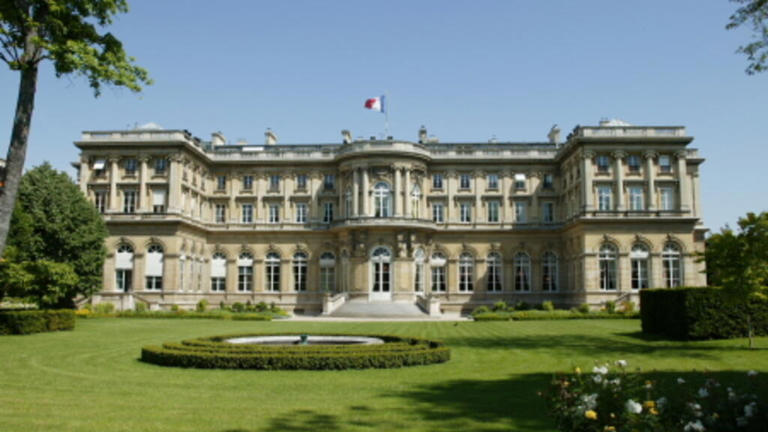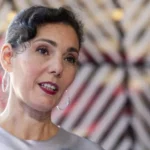The heads of French diplomatic missions will not meet this year in Paris as they have done since 1993. A decision that could further increase the unease that began in 2022 between the Élysée and the Quai d’Orsay.
The essential meeting of French diplomacy will not take place this year. The 30th annual conference of ambassadors, which is usually held in late August and early September, has been cancelled. The official reason? The Paralympic Games are mobilising too many government departments for this gathering of diplomats to be held.
“What seems surprising is to cancel everything,” comments Michel Duclos*, former ambassador, special advisor to the Montaigne Institute. We could have imagined this meeting in a reduced format. In this gathering, the most important moment is the president’s speech. The ambassadors are received at the Élysée with great pomp and listen religiously to the presidential speech.”
Since 1993, except during the Covid crisis, French diplomatic representatives have been received at the Élysée and the Quai d’Orsay by the President of the Republic and the Minister of Foreign Affairs. The objective of this gathering is to set the main foreign policy guidelines, priorities, discuss challenges, etc.
“It is important that this meeting be held”
“This meeting allows the highest authorities of the State and the Minister of Europe and Foreign Affairs to give the annual guidelines that will guide the work of France’s representatives abroad and with international organizations (…) It is a central moment for French diplomacy punctuated by strong moments”, we can read on the official website of French diplomacy.
So nothing will happen this year? The Quai d’Orsay spokesperson refused our request for more information on this cancellation. “The ambassadors’ conference should take place in January,” a Quai d’Orsay diplomat told RFI. “And it’s important that it be held because for the ambassadors, for the heads of post and for the collective, it’s a meeting that is quite structuring. Given the work of field diplomacy and the need to have regular exchanges with the authorities so that the course is set, to hear the major priorities, it’s important that this meeting be held.”
A mutual disenchantment?
At the Quai d’Orsay, many diplomats see this official cancellation as a new sign of the authorities’ lack of interest in their work, already more than undermined in 2022 after the reform of the diplomatic corps that gave generations of ambassadors to France. A “historical mistake”, declared Dominique de Villepin, former Minister of Foreign Affairs, who warned of the risk of a “loss of independence, competence, memory that will weigh heavily in the years to come”.
Now, since there are no more career diplomats, “cronyism” seems to have become commonplace at the Ministry of Foreign Affairs (MAE), testifies anonymously a connoisseur of French diplomacy who has trodden the corridors of the Quai in France and abroad for many years. “Look at the Senghor promotion, that of President Macron. Look at how many of his colleagues have been appointed ambassadors! The president has crisscrossed the Quai with his friends.” And then, “there is a hyper-presidentialization that gives the impression of being useless”.
“We must not put everything on President Macron’s back,” tempers Michel Duclos. There is a natural evolution of things which means that today international affairs in the State are also the Ministry of Defense, the DGSE, the AFD (French Development Agency, Editor’s note) which has gained a lot of weight in recent years, it is the Ministry of Finance. Thus, the Quai d’Orsay has become an instrument of foreign policy among others. This has always been the case, but perhaps not at this level.”
“There is the president, of course, but there are also his teams, explains our other diplomatic source currently in office. We work with the diplomatic cell. There is still this circuit that remains. The president has a form of autonomy in his management of international affairs and diplomacy. Sometimes, we say to ourselves: “Oulala, this is not what we had planned”. But, afterwards, we still keep a channel with the diplomatic cell, thank goodness! Because the day we lose this channel, effectively, nothing is decided at the Quai d’Orsay! But what is said is still heard within the diplomatic cell. Afterwards, what the president does with it is something else.”
And the former French ambassador to Syria Michel Duclos notes that the current president is an exception: already under François Mitterrand and up until Nicolas Sarkozy, presidents have always had, when they took office, prejudices about diplomats. But over time, a climate of trust was created and things returned to the tradition of General de Gaulle where diplomats do not make foreign policy, but are on the other hand listened to and close to the president. “So in general the prejudices against diplomats that new presidents have fall away with experience. That did not happen with Macron.”
One example among others, this unprecedented approach by French diplomats in the Middle East and the Maghreb: “The ambassadors’ letter” to Emmanuel Macron. Last November, a dozen diplomats sent a joint note to the Élysée Palace in which they regretted the head of state’s pro-Israeli shift since October 7. They “affirm that our position in favor of Israel at the beginning of the crisis is misunderstood in the Middle East and that it is at odds with our traditionally balanced position between Israelis and Palestinians,” a diplomat said in the columns of Le Figaro.
French diplomacy is losing momentum
As a result, this malaise between the Élysée and the Quai d’Orsay has led many diplomats to throw in the towel, even young ones, out of spite and dismay. With a solid background, often including the famous diploma from the Orient executive competition, and a perfect command of their geographical area, they regularly join the private sector as analysts or set up their own businesses. After the loss of some 20,000 jobs in twenty years, a third of the Quai d’Orsay’s agents have considered or are considering leaving the MAE for good, which represents only 0.7% of the State budget. The French diplomatic network is now the 5th in the world, losing two places in one year, according to the Australian think tank The Lowy Institute, with 249 embassies and consulates and 16 permanent representations to multilateral bodies. Some 14,000 agents are employed by the Quai d’Orsay.
With mixed results internally and a proliferation of crises internationally, French diplomacy seems to be losing momentum. “We have not renewed what I call our strategic compass,” analyzes Michel Duclos. “We are still living on the ideas of General de Gaulle. This arrogance that makes France a major player among other major players has gradually locked us into a form of strategic solitude, at a time when, moreover, in terms of objective material forces, the economy, things like that, our place was increasingly relativized. So, we have somewhat lost our compass in the world. And our alternative strategy, which is Europe, is itself in a bit of difficulty. It is all the more regrettable that the Élysée and the Quai d’Orsay and others who are interested in foreign policy are not capable of recreating momentum and a new consensus on fundamental issues. »
If diplomacy is the second area of privileged competence of the President of the Republic, before any “strategic compass” it will be appropriate for French diplomacy to find a non-resigning tenant of the Quai d’Orsay, and of course above all a Prime Minister for France. Because, as our diplomatic source within the ministry confides, “since we no longer have a government, it’s complicated to make ourselves heard! We’re going to have to get moving, because there are still major events coming up… Without authority, it’s going to be complicated to make ourselves heard!”
This article is originally published on msn.com








